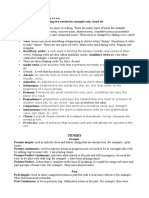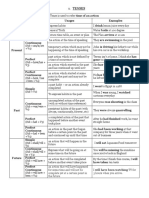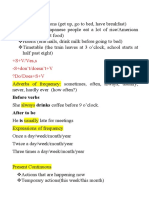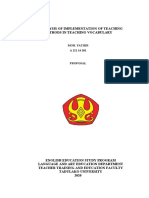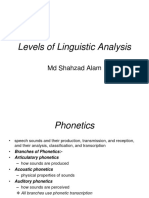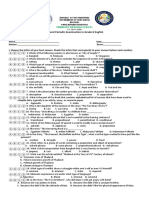Pre-Reading Session
1
� Main Parts of Speech
➢ Noun
The name of something, like a person, animal, place, thing, or concept. Nouns are typically used as
subjects, objects.
EX: I have a racing car.
➢ Verb
This expresses what the person, animal, place, thing, or concept does. In English, there are stative
verbs and action verbs.
EX: It takes a good deal of dedication to complete a doctoral degree.
2
� Main Parts of Speech
➢ Adjective
This describes a noun or pronoun. Adjectives typically come before a noun or after a stative verb, like the
verb "to be."
EX: The smart student wins the chess tournament.
EX: It can be difficult to balance time to study and work responsibilities.
Remember that adjectives in English have no plural form. The same form of the adjective is used for both
singular and plural nouns.
EX: A different idea.
EX: Some different ideas.
3
� Main Parts of Speech
➢ Adverb
This gives more information about the verb and about how the action was done. Adverbs tells how,
where, when, why, etc.
EX: He completed the course successfully.
Depending on the context, the adverb can come before or after the verb or at the beginning or end of a
sentence.
EX: Usually the summer is hot.
EX: The summer is usually hot
EX: The summer is very hot usually.
4
� Main Parts of Speech
➢ Pronoun
This word substitutes for a noun or a noun phrase (e.g. it, she, he, they, that, those,…).
EX: In 2020, Smith interviewed the applicants as they arrived.
They = applicants
EX: He was interested in ideas that were never previously recorded, not those that have already been
published.
EX: He = Smith; that = ideas; those = published ideas
5
� Main Parts of Speech
➢ Preposition
This comes before a noun or a noun phrase and links it to other parts of the sentence. These are usually
single words (e.g., on, at, by,…) but can be up to four words (e.g., as far as, in addition to, as a result of).
EX: I chose to interview teachers in the district closest to me.
EX: The recorder was placed next to the interviewee.
EX: I stopped the recording in the middle of the interview due to a low battery.
6
� Tenses
➢ Simple Present
Subject + V1 + s/es + Object. (Singular)
Subject + V1 + Object. (Plural)
EX: She works for Sony.
EX: They work for Sony.
EX: I play football every weekend.
➢ Simple Past
Subject + V2 + Object.
7
� Tenses
EX: Students played a football game last week.
EX: He read the newspaper yesterday.
➢ Simple Future
Subject + will + V1 + Object.
Subject + (is, am, are) going to + V1 + Object.
EX: I will go to my home town.
EX: He is going to complete his task in a few minutes.
8
� Tenses
➢ Present Continuous
Subject + is / am / are + V1 + ing + object.
EX: I am playing the game.
EX: He is studying in college.
EX: They are playing chess.
➢ Past Continuous
Subject + was + V1 + ing + Object. (Singular)
Subject + were + V1 + ing + Object. (Plural)
9
� Tenses
EX: They were eating at the restaurant.
EX: I was studying last night when Ahmad called me.
➢ Present Perfect
Subject + has + V3 + Object (Singular)
Subject + have + V3 + Object (Plural)
EX: They have seen this movie before.
EX: He has won two matches so far.
10
� Tenses
Tenses Tenses Rule Examples
Past Perfect Subject + had + V3 + Object
He had won two matches until that day.
Past perfect continuous Subject + had been + V1 + ing + Object He had been playing a game for ten
years.
Present perfect continuous Subject + has been + V1 + ing + Object (Singular)
He has been playing a game for ten
Subject + have been + V1 + ing + Object (Plural)
years.
Future Perfect Subject + will have/shall have + V3 + Object
He will have won two matches by then.
Future Continuous Subject + will be/shall be + ing + V1 + Object He will be playing a game and she will
be watching TV.
Future Perfect Continuous Subject + will have been + V1 + ing + Object He will have been playing a game for
ten years.
11
� Verbs
➢ Verbs: are words that show an action (sing) or state of being (exist).
➢ There are three verb forms, present, past and past participle.
➢ There are two types of verbs, regular verbs and irregular verbs.
For regular verbs, we can form V2 and V3 by adding (ed) to the base form.
V1 = Visit V2 = Visited V3 = Visited
For irregular verbs, there is no rule, you have to memorize the second and third forms of each irregular
verb.
V1 = Speak V2 = Spoke V3 = Spoken
12
� Verbs
➢ In English if you want to follow a verb with another action, you must use a gerund or infinitive.
EX: I like helping my co-workers.
EX: I want to see a movie.
➢ Verbs followed by a gerund '-ing' form:
(admit, advise, allow, anticipate, appreciate, avoid, can’t help, celebrate, confess, consider,
defend, delay, discuss, dislike, enjoy, escape, explain, feel, like, finish, forgive, give up, keep,
keep on , mention, miss, practice, prevent, recommend, report, resume, suggest, support and
understand).
EX: He misses playing with his friends.
13
� Verbs
➢ Verbs followed by an infinitive:
(agree, appear, arrange, ask, attempt, can/can’t afford, can/can’t wait, care, chance, choose,
claim, come, decide, demand, deserve, determine, elect, expect, fail, get, grow, guarantee,
hesitate, hope, hurry, learn, manage, mean, need, neglect, offer, pay, plan, prepare, pretend,
promise, prove, refuse, remain, request, resolve, say, seek, seem, strive, struggle, swear,
tend, threaten, volunteer, wait, want, wish and would like)
EX: I want to learn Arabic.
➢ Verbs followed by a gerund or infinitive:
(begin, can’t bear, can't stand, continue, hate, like, love, prefer, propose and start)
14
� Passive vs Active
➢ When a sentence is in the active voice, the subject of the sentence is the one doing the action
expressed by the verb. In the passive voice, the subject is the person or thing acted on or
affected by the verb's action. The passive voice is typically formed with a form of the
verb be, such as is, was, or has been, and the past participle of the verb of the sentence.
Active : Subject + Verb + Object.
EX: I make a cake.
Passive: The object comes in the begging of the sentence.
EX: a cake is made by me.
Passive Form: Be + P.P
15
� Passive vs Active
16
� Grammar snacks
➢ If there is a blank after is / am / are, firstly check the sentence type whether it is active or passive. If
it is active then use Verb 1st + ing and if it is passive then use Verb 3rd.
EX: He is playing football.
EX: this letter is written by Ahmad.
➢ If there is a blank after is / am / are + being, use Verb 3rd.
EX: This conversation is being recorded.
➢ If there is a blank after do / does / did, use Verb 1st.
EX: I am willing to admit that I do make mistakes.
17
� Grammar snacks
➢ After (have, has, had) always comes V3.
EX: We have eaten already.
➢ If there is a blank after was / were, firstly check the sentence types if it is active or passive. If it is
active then use Verb 1st + ing and if it is passive then use Verb 3rd.
EX: We were eating the dinner.
EX: a letter was written by Ahmad.
➢ If there is a blank after was / were + being, use Verb 3rd.
EX: A cake was being made.
18
� Grammar snacks
➢ If there is a blank after has / have / had + been, firstly check the sentence type, if it is active or
passive. If it is active then use Verb 1st + ing and if it is passive then use Verb 3rd.
EX: Many history stories have been worked over for television.
EX: Some of these people have been living on the streets for years.
➢ If there is a blank after will + be, firstly check the sentence type, if it is active or passive. If it is
active then use Verb 1st + ing and if it is passive then use Verb 3rd.
EX: I am the new manager and you will be working under me.
EX: Without practice, hopes will be reduced to zero.
19
� Grammar snacks
➢ If there is a blank after will have + been, firstly check the sentence type if it is active or passive. If it
is active then use Verb 1st + ing and if it is passive then use Verb 3rd.
EX: By next year all the money will have been spent.
EX: I will have been studying English for three years by the end of this course.
➢ If there is a blank after being / be / been, use Verb 3rd for passive, and if there is a blank after / been,
use Verb 1st + ing for active.
EX: He's been working hard all day.
EX: Many history stories have been worked over for television.
20
� Grammar snacks
➢ If there is a blank after A lot / Many / Much / Other / Some of, use plural noun in blank.
EX: Many heads are better than one.
EX: Some of the most important questions remain unanswered.
➢ If there is a blank after verb 3rd, use adverb in blank.
EX: He failed completely in the performance of his duty.
21
� Grammar snacks
➢ Use same meaning word before and after (and) in most cases but not all.
EX: Reports of this kind are guaranteed to cause anxiety and tension.
➢ Use the opposite meaning word before and after (or) in most cases but not all.
EX: I can't judge whether he was right or wrong.
➢ The verbs before and after (and) have the same form.
EX: Yesterday I went to the gym and did some exercises.
EX: The children were playing video games and watching TV when I came back home.
22
� Grammar snacks
➢ The nouns before and after (and) have the same form (plural or singular).
EX: Discuss all the advantages and disadvantages of the topic.
➢ We use that when we describe to people and things.
EX: I want a car that accelerates quickly.
➢ We use which when we describe to things.
EX: This computer, which used to work just fine, isn’t saving my files correctly
23
� Grammar snacks
➢ Always comes infinitive verb after To if the verb is missing in the sentence.
EX: I am here to watch a movie.
➢ We use who when we describe to People.
EX: The store manager, who is friends with my dad, can get us a deal on a dining table.
➢ We use That with essential information and we use which with extra information.
EX: The car that I hired last week was making strange noises.
EX: My car, which is brand new, was making strange noises.
24
� Grammar snacks
➢ Always comes a gerund (-ing) form after (While / for/ when) if the verb is missing in the
sentence.
EX: while exploring the options, I found the correct answer.
➢ Always comes a (verb + s) after (it, which, that, singular subject) if the verb is missing in the
sentence.
EX: It plays an important role in preventing poverty.
25
� Articles
Article: a word that comes before a noun or adjective to show if it's specific or general.
The: before a singular or plural noun.
A: before a singular noun beginning with a consonant sound.
An: before a singular noun beginning with a vowel sound.
NON-
COUNTAB
Rule COUNTABLE Examples
LE NOUNS
NOUNS
Specific identity not
a, an (no article) We are looking for an apartment.
known
I ate an apple yesterday. The apple was
Specific identity known the the
juicy and delicious.
All things or things in Trees are beautiful in the fall
(no article) (no article)
general I do not like coffee
26
� Present Perfect vs Simple Past
➢ You must always use the present perfect when the time of an action is not important or
not specified.
EX: I have seen this movie before.
➢ You must always use the simple past when details about the time or place that an
action occurred are given or requested.
EX: He met his wife 6 years ago.
27
� Adjectives end with ed, ing
➢ If you are describing someone's feelings, then you would use –ed.
EX: I’m so excited to watch the match.
➢ If you are describing the characteristic of the event, then you would use –ing.
Ex: Yesterday I watched an interesting movie.
Ex: I am bored. (correct).
Ex: I am boring. (we hope it’s incorrect).
28
� collocations
➢ Adjective + noun: Fast food ( I don’t like eating fast food).
➢ Verb + noun: To make a mistake (He always makes mistakes when he speaks).
➢ Verb + adverb: Fully recover (It will take some time for the patient to fully
recover).
➢ Adverb + adjective: Fully aware (Are you fully aware of the implications of your
action).
➢ Noun+ noun: Cheese cake (She really loves cheese cake).
➢ Verb + preposition: Depend on (You can't depend on your parents forever).
29
�30
